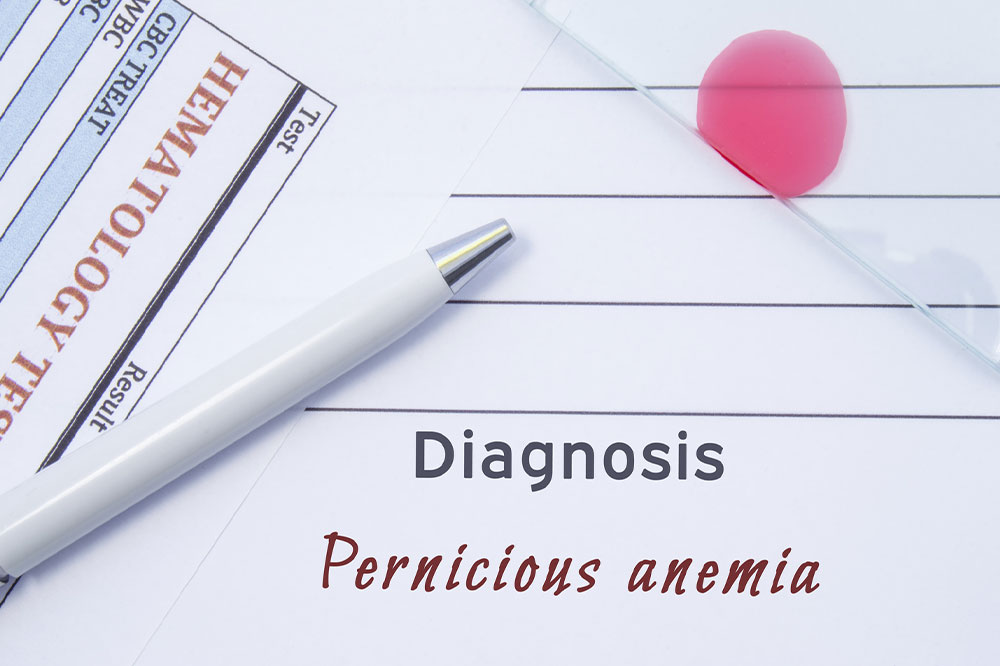
Pernicious anemia – Causes, symptoms, and management
Pernicious anemia is a condition in which the body is unable to produce enough red blood cells. Here, anemia is caused by inadequate absorption of vitamin B12 in the body, resulting in a deficiency of this nutrient. If left untreated, it can lead to complications such as heart disease and neurological impairment. Learning about the causes, symptoms, and available treatment options is crucial for getting a prompt diagnosis and managing the condition.
Causes
Pernicious anemia is a rare condition, affecting around 0.1% of the population. In order to prevent it, it is important to know the potential causes:
- Autoimmune disorders: Here, the immune system attacks and destroys cells in the stomach that produce a glycoprotein called intrinsic factor, which helps the body absorb vitamin B12. This results in a deficiency of vitamin B12 and, consequently, pernicious anemia.
- Stomach and intestinal disorders: Certain conditions that affect the stomach or intestines can lead to pernicious anemia. These include Crohn’s disease, celiac disease, and other inflammatory bowel diseases that affect the body’s ability to absorb vitamin B12.
- Surgery: If one has undergone surgery to have a part or all of the stomach removed, the body may not produce enough intrinsic factors, which can lead to pernicious anemia.
- Vegan or vegetarian meal regimen: As vitamin B12 is mostly found in animal-based foods, those who follow strict vegan or vegetarian food plans may be at risk of developing pernicious anemia if they do not get enough vitamin B12 from other sources.
Symptoms
“Pernicious” indicates harmful effects, and as the name suggests, pernicious anemia can harm certain functions of the body. Here are its common symptoms:
- Fatigue and weakness: These symptoms are often the earliest signs of pernicious anemia. Fatigue may develop due to a lack of oxygen supply to the cells, leading to exhaustion.
- Shortness of breath: The oxygen levels in the body drop when affected by this condition, making breathing difficult.
- Pale or yellowish skin: This symptom can indicate that the body is not producing enough red blood cells.
- Tingling or numbness: Nerve damage is a common side effect of pernicious anemia, leading to these sensations.
If one notices any of these signs, they should consult a doctor to seek treatment.
Diagnosis
However, this form of anemia can be challenging to diagnose as it may not present with any noticeable symptoms at first. However, if one suspects they are affected by the condition, it is crucial to seek medical care quickly to avoid serious complications. Here are the tests the doctor might suggest to confirm pernicious anemia:
- Complete blood count (CBC): A CBC can help detect anemia and other abnormalities in the red and white blood cells.
- Vitamin B12 test: This blood test measures the level of vitamin B12 in the body and can detect a deficiency.
- Schilling test: This test evaluates how well the body absorbs vitamin B12.
- Endoscopy: The procedure can help identify any damage or inflammation in the digestive tract that may be causing symptoms.
- Bone marrow biopsy: In some cases, doctors may recommend a bone marrow biopsy to assess red blood cell production and determine if pernicious anemia is the underlying cause for visible symptoms.
Treatment
If one is diagnosed with pernicious anemia, timely treatment can help them manage the condition and lead a healthy life. Here are a few common options doctors might suggest:
- Prescription treatment: The most common treatment for pernicious anemia is inserting vitamin B12 into the body. This helps the body get the vitamin that it is unable to absorb on its own.
- Vitamin B12 supplements: In some cases, B12 supplements may be effective in addressing the deficiency. However, the supplements may not be able to deal with severe malabsorption in the body.
- Food-related changes: The doctor may suggest changes in the food regimen to add more sources of vitamin B12, such as meat, fish, and dairy products.
Prevention
It is also possible to take preventative measures to reduce the risk of developing the disease. Here are some tips for preventing pernicious anemia:
- Follow a balanced food regimen: Foods rich in nutrients like vitamin B12 and folate can help the body stay healthy and prevent anemia.
- Ensure adequate vitamin B12 intake: Vitamin B12 plays a vital role in producing red blood cells, so one should get enough of it through daily meals or supplements. Some excellent sources of B12 are meat, dairy, and eggs. One should consult a doctor for opting for a supplement.
- Manage other health conditions: If one is affected by a health condition that can increase the risk of pernicious anemia, such as Crohn’s disease or celiac disease, getting treatment for such issues can help prevent anemia.




